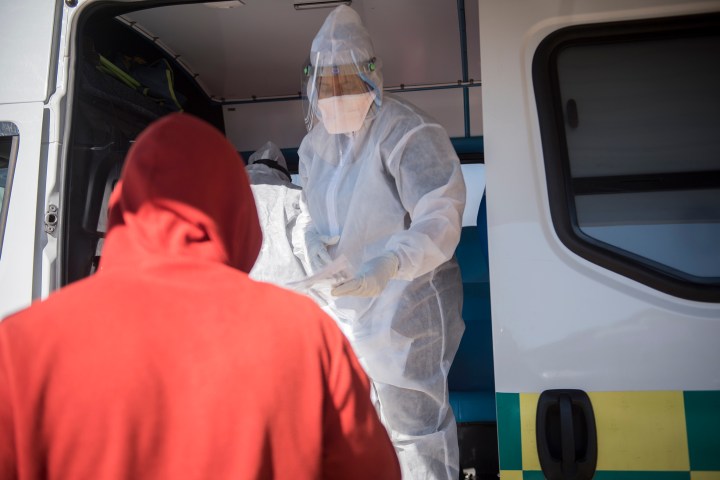Coronavirus
Why there’s a backlog: The complicated process of testing for Covid-19

With a turnaround time of three to five days, the process of testing for SARS-CoV-2 is not as quick or simple as one may think. Coupled with random testing and the scarcity of resources, there is a backlog of thousands of tests.
As of 4 June, a total of 820,675 Covid-19 tests had been conducted in South Africa, with 40,792 of those tests being positive,
Determining whether an individual requires a test is dependent on the case definition, which often changes during a pandemic.
According to the National Institute for Communicable Diseases (NICD), the current case definition for persons under investigation who should be tested for Covid-19 is as follows:
- The patient presents with symptoms such as a cough, sore throat, shortness of breath, or a fever (>38°) AND in the 14 days prior to onset of symptoms, met at least one of the following criteria:
-
- Was in close contact with a confirmed or probable case of SARS-Cov-2 infection; OR
- Has a history of travel to areas with local transmission of SARS-CoV2; OR
- Worked in or attended a healthcare facility where patients with SARS-CoV-2 infections were being treated; OR
- Was admitted to hospital with severe pneumonia of unknown origin.
Testing process
There are several ways to test for Covid-19. The most common method is to collect nasopharyngeal (nose) and oropharyngeal swabs from an individual. These swabs are then placed into a universal transport medium (UTM) to prevent contamination and are transported the same day.
The samples are kept at 2°-8°C in a medical cooler box with ice packs, which prevents the sample from deteriorating and resulting in an unusable test.
Dr Jean Maritz, a clinical virologist at PathCare, explained what happens to these samples once they are delivered to the laboratory.
It takes a team of laboratory assistants, medical technicians, and medical scientists to test samples taken from suspected cases.
The actual testing process is based on the amplification and detection of unique SARS-CoV-2 viral nucleic acid sequences by a real-time polymerase chain reaction machine (PCR).
Simply put, this machine will ultimately create “photocopies” of the virus’s genes should it be present in the sample.
Once the samples are delivered, laboratory assistants receive them through a chute in an extraction area. Details of the specimen, such as patient ID and the name of the referring doctor, are captured onto a worksheet and received on the system.
Samples are then removed from the extraction area and taken to an area which is separated for contamination and prevention reasons. A reagent (a substance used to produce a chemical reaction) is then made up and applied to the sample and placed on a plate.
Before starting the run in the real-time PCR machine, it is essential to spin the plate to ensure that the reagent and the DNA molecules are properly combined.
After a few seconds of spinning the plate, the sample is taken to the PCR machine. Quality control measures then have to be made. These quality controls are used to validate whether the instrument is operating within the predefined specifications. If these controls are not met, it would interfere with the results of the test.
The amplification (“photocopying”) process takes approximately two hours for each sample, after which a result is generated. A report is then printed and the results are entered manually on the system.
Once the analysers are finished and the scientists have completed the analysis, a medical scientist receives the reports and sends them out, with positive cases being prioritised.
The pathologist is contacted first, who then contacts all the referring doctors to make sure that those patients are made aware that they have tested positive for Covid-19.
PathCare sends an SMS to each patient, informing them of the result, stating whether or not the virus was detected.
The backlog of tests
Maritz says that “at the moment we [medical professionals] are sticking to the case definition for testing someone for Covid-19. If you display any symptoms, it is important to phone your doctor or the emergency room and ask them whether you can come for an assessment.
“We need this mechanism. We are inundated with tests, we have scarce resources and we need to rationalise the use of these resources and we rely on all healthcare workers to help us in maintaining our capability to test all of those that need testing.”
Maverick Citizen previously reported that there is a backlog of nearly two weeks, and more than 20,000 people who were tested may not find out whether they have Covid-19. This is due to several reasons, including the scarcity of resources such as reagent and manpower.
There has been an outcry from doctors, virologists and infectious disease experts who are appealing to the government to stop random Covid-19 testing and to deal with the testing backlog.
These medical professionals, particularly Professor Marc Mendelson, Professor Shabir Madhi, Dr Jeremy Nel, and Professor Francois Venter, suggest that the limited resources available for Covid-19 testing in South Africa are unlikely to increase in the next few months.
These resources need to be “unconditionally reserved for where needs are the greatest, and that’s in our healthcare facilities”. DM/MC
"Information pertaining to Covid-19, vaccines, how to control the spread of the virus and potential treatments is ever-changing. Under the South African Disaster Management Act Regulation 11(5)(c) it is prohibited to publish information through any medium with the intention to deceive people on government measures to address COVID-19. We are therefore disabling the comment section on this article in order to protect both the commenting member and ourselves from potential liability. Should you have additional information that you think we should know, please email [email protected]"






 Become an Insider
Become an Insider